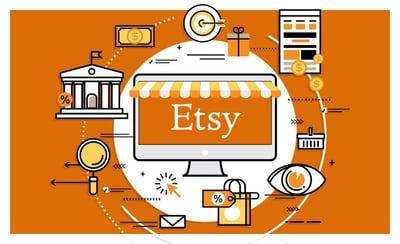Peer-to-Peer E-Commerce
Everything you need to know before opening an Etsy shop
 Peer-to-Peer (P2P) e-commerce businesses, over the last ten years, have become a mecca for the independent sellers and business alike. Those with a knack for knitting, jewelry design, or furniture making, have flooded platforms like Etsy, specifically, to sell their wares to the less crafty cohort on the Internet. It is a great concept, and thousands of beautiful pieces are created and shipped on a daily basis. If you are a crafty sort, you might be considering opening your own shop and offering your creations to the masses, and that’s great, but there are a few things you should know before you open shop to ensure your time is successful.
Peer-to-Peer (P2P) e-commerce businesses, over the last ten years, have become a mecca for the independent sellers and business alike. Those with a knack for knitting, jewelry design, or furniture making, have flooded platforms like Etsy, specifically, to sell their wares to the less crafty cohort on the Internet. It is a great concept, and thousands of beautiful pieces are created and shipped on a daily basis. If you are a crafty sort, you might be considering opening your own shop and offering your creations to the masses, and that’s great, but there are a few things you should know before you open shop to ensure your time is successful.
Know Your Market
Before you open a shop on a P2P e-commerce business platform, it is a good idea to do some market research to better understand who you are selling to and if your business can be profitable. For example, if you plan to open a shop selling cloth diapers, you’ll want to research the type of person buying such items, and the number of stores already opened that are selling a similar product. By doing so, you will gain a better understanding of the market demand, what your price point should be, and how quickly you should expect to have your business up and moving.
Avoid Copyrighted Images or Slogans
In the early days of Etsy, sellers would craft products that used images owned by other companies. This, however, was never legal and threatened to undo Etsy at its very core. Since the original copyright infringement concerns came to light, Etsy and individual companies have cracked down hard on sellers, meaning they can’t use the intellectual property of others in their designs. Everything from slogans, to mascots, can be copyright material, so before you add anything new to your shop, do some investigating. Failing to check copyrights can cause your store to be shut down, and it can be a long and arduous road to having it reopened.
This particular problem does not apply if you are reselling items on a site like eBay, however, if you are crafting original items using images from, say, Disney (think making a onesie with Mickey Mouse on it) you can run into trouble. Etsy relies heavily on user reports, and will shut down any shop they believe is in violation.
Taxes for Etsy Sellers
Etsy sellers, like any other P2P e-commerce business platform, are considered self-employed and must submit taxes for any and all products that they sell, as long as you meet the $600 tax threshold. That means, if you’ve made more than $600 in a calendar year through sales, you’ll need to submit a self-employment tax form. This form, traditionally known as a Schedule C will include information about your business’ profits and losses. You may also need to fill out a schedule SE, for self-employment tax. Both of these forms will be required, even if you are a sole proprietor. A certified accountant can help you figure out these forms, and fill them out for you. Using a CPA is a good way to ensure your taxes are paid properly and you won’t face penalties at a later date.
Now that you know the basics, it is time to get selling. If you’ve spent some time investigating and considering our three basic tips for getting started, you should enjoy a great deal of success on the platform.
